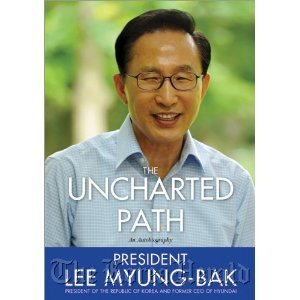President’s English autobiography ‘The Uncharted Path’ to be published in U.S. on Nov. 1
President Lee Myung-bak reiterated his commitment to unification with North Korea and his trademark policy of “green growth” in his upcoming autobiography, saying a unified Korea would be a blessing for the world, and he would continue to champion a greener future after leaving office.
“A peaceful peninsula will have enormous benefits that will go far beyond the region,” Lee says in the English-language autobiography, titled, “The Uncharted Path,” according to an electronic copy of the book set to hit store shelves on Nov. 1 in the United States.
The presidential office provided the copy.
“It is not surprising that the question I get asked most often is whether I see the Korean Peninsula eventually reuniting, and if so, when I expect that to happen. I honestly do not know when, but I do know that it will happen,” he said. “Permanent peace is possible on the Korean Peninsula, and a stable and unified Korea will contribute to global peace and prosperity.”
The book is mostly a translated version of Lee’s best-seller Korean-language autobiography, “There Is No Myth,” which was first published in 1995, but the English-language edition has additional chapters about his life as Seoul mayor and president of South Korea.
Lee, 69, who earned the nickname “Bulldozer” for his drive to push through challenges and get things done as Hyundai CEO in the 1970s-1990s, took office in early 2008 on a wave of popularity for his promises to catapult South Korea to join the ranks of advanced countries. During his campaign, he urged voters to elect an “economic president.”

But the financial meltdown that struck the world later that year dealt him a blow.
Lee confesses in the book, “I never dreamed that barely a year after taking office, I would have to struggle to keep the Korean economy from sinking. It was a chilling reminder of how fragile our world is, how ill-prepared we can sometimes be, and how in this era of connectivity our collective fates ― for better or worse ― are tied together.”
The financial crisis led to the creation of the Group of 20 major advanced and emerging economies’ forum credited for helping the world get out of the crisis. South Korea is a member of the forum, and hosted a summit in November last year, a feat that Lee takes great pride in.
South Korea also pulled itself out of the crisis earlier than other nations.
“There were painful moments to endure and difficult decisions to make. But there have also been proud achievements and joyous celebrations,” Lee says in the book. “For example, I was proud when Korea successfully hosted the G20 Seoul summit, thereby contributing to charting a new path forward.”
Another focus of his administration was his “Low Carbon Green Growth” policy.
It calls for lessening South Korea’s dependence on fossil fuels and promoting the development of alternative energy sources, such as solar and wind power, and other technologies that increase energy efficiency so as to cope with climate change.
Lee believes the strategy will provide South Korea with fresh growth engines for its economy and help the country ― one of the world’s biggest greenhouse gas emitters ― reduce the emission of carbon dioxide and other heat-trapping gases amid growing calls to curb global warming.
In the book, Lee says he will continue to work for the cause after retirement in early 2013.
“After I leave office, I will continue to serve. I will visit my friends abroad and work with them so that all of us can enjoy a more sustainable and greener future,” he says. “I will take part in educating our children about the importance of sustainability, green growth and protecting our environment.”
Lee also says he will use his charity foundation, “The Lee & Kim Foundation,” to help younger generations suffering from poverty and other difficulties like he did five decades ago. Lee gave up most of his personal assets to establish the foundation named after him and first lady Kim Yoon-ok.
In the book, Lee also offers accounts of how he, as Seoul mayor, overcame widespread opposition to a previously inconceivable project to open up the long-paved-over Cheonggyecheon stream to create a new landmark in the capital.
The project also earned him environmental credibility.
“From July 2002 until June 2003, our team met with the shopkeepers a total of 4,200 times,” Lee says. “We resolved close to 1,000 requests. As a result of such strenuous effort on our part, the shopkeepers and various organizations finally agreed to our plan just fifteen days before the scheduled start of the project.”
The autobiography also chronicles Lee’s rags-to-riches story, including how poor his family was in the wake of the 1950-53 Korean War that reduced the country to aches, and how hard he worked to rise to become the CEO of Hyundai, a national legislator and then Seoul’s mayor.
“Poverty clung to my family like a leech,” Lee says in the book. “Taking lunch to school was, of course, out of the ques
While other kids ate their lunches, I would go outside to the water pumps and fill my stomach with water. I remember drinking until I became bloated. That’s when I learned that no matter how much you drink, water never makes you full.”
(Yonhap News)








![[Today’s K-pop] Blackpink’s Jennie, Lisa invited to Coachella as solo acts](http://res.heraldm.com/phpwas/restmb_idxmake.php?idx=644&simg=/content/image/2024/11/21/20241121050099_0.jpg)